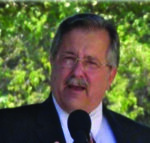
When Newsweek magazine published an article several years ago lamenting the lack of knowledge among the youth of the United States, there were 1,274 two-year colleges in the United States that collectively enrolled nearly five million students.
Dr. James M. O’Neill taught English composition at four of those colleges in two different states. During his fifteen-year career he became increasingly concerned about the lack of knowledge among so many of his college-age students.
That was when he decided to present his pupils at the South Puget Sound Community College in Olympia, WA, with an 86-question “general knowledge” test on the first day of class one year.
The questions that O’Neill devised were not trivial, nor were they technical. They were based on simple facts pertaining primarily to history and geography—basic information about world-renowned people and well-known places that any high school graduate should know.
The exam was given to twenty-six students ranging in age from eighteen to fifty-four. All of them had completed at least one semester of college-level work.
Here is just a sampling of what O’Neill learned concerning how much (or little) his students really knew.
With respect to famous people, his students said that: Charles Darwin invented gravity; Sid Caesar was an early Roman emperor; Mark Twain invented the cotton gin; Heinrich Himmler invented the Heimlich maneuver; Jefferson Davis was the guitar player for the rock band Jefferson Airplane; Socrates was an American Indian chieftain; and Jesus Christ was born in the 16th century.
Professor O’Neill went on to say that “most students answered incorrectly” and that some of them “meticulously wrote ‘I don’t know’ as many as eighty-six times.” (Remember, there were only eighty-six questions on the test).
No wonder why many people conclude that what we have witnessed during the past several decades is the “dumbing down of America.” In the words from the title of a Jim Carrey comedy, as a nation we seem to be growing increasingly “Dumb and Dumber.”
Illiteracy in the Pew
In my opinion, the only thing more pathetic than this pitiful lack of knowledge among so many youth today, is an ever-increasing Biblical illiteracy in the pew.
According to the Princeton Religious Research Center, over half of all Americans cannot name the four Gospels. More than one third do not know the number of Jesus’ disciples. And, in spite of many very familiar Christmas carols, one third do not even know the name of the town where Jesus was born.
A recent Gallup Poll found that less than four out of every ten Protestants know that it was Jesus who said, “Ye must be born again.”
And another national periodical published an article titled “The Startling Belief of Our Future Ministers.” It included the results of a survey taken by the ministerial students at several major denominational schools. To be sure, not all of them were Evangelical—but, remember, these were still men and women preparing for full-time ministry.
When asked the following questions,
Do you believe in a physical (bodily) resurrection?
54% said “no.”
Do you believe in the virgin birth of Christ?
56% said “no.”
Do you believe in a literal heaven and hell?
71% said “no.”
Do you believe in the deity of Jesus Christ?
89% said “no.”
Do you believe that man was born in sin, and separated from God?
98% said that “they were not concerned.”
Do you believe in the second coming of Jesus Christ?
99% said “no.”
God’s People Need Knowledge
As I have reflected on these tragic facts and disturbing trends, I could not help but think of the Word of the Lord, spoken through His prophet, Hosea, “My people are destroyed for lack of knowledge” (Hos 4:6, emphasis added).
Ignorance is not bliss! God places no premium on ignorance. In fact, in what our Lord Jesus regarded as the supreme command, we are told to love the Lord our God with all our mind, as well as with all our heart and soul and strength (Mark 12:30).
I believe that to love Him with all our mind demands (among other things) we must grow in our knowledge of the Bible.
In previous articles, I have noted that Peter presents us with a Divine “blue print” that specifies seven building blocks that are to be used in the framing and fashioning of Christians in and under construction.
In the remainder of this article I want to examine the second building block of knowledge.

Principles for the Attainment of Knowledge
The Greek word translated “knowledge” is gnosis. The transliterated Greek root gno appears in our English word, “agnostic,” which means “unknown,” and in our English word “ignoramus,” which literally means “one who is not knowing.”
Gnosis is found in its various forms over two hundred times in the New Testament alone. In the context of 2 Peter 1 it refers essentially to the knowledge of God—of coming to know who He is, primarily through what He says—that is, through His special revelation of Himself. Thus, the source of this knowledge is God Himself, concerning whom Paul exclaimed in this beautiful burst of praise, “Oh, the depth of the riches of the wisdom and knowledge [gnosis] of God” (Rom 11:33).
And so we read, for example, in Prov 2:6, “For the Lord gives wisdom, and from His mouth come knowledge [gnosis, LXX] and understanding.” He Himself is indeed the very source of this knowledge to which Peter refers.
I like the nuance of the paraphrase of this term in the Living Bible, “His every word is a treasure of knowledge” (Prov 2:6, emphasis added). I especially like what John says concerning His Word: “And the Word became flesh and dwelt among us, and we beheld His glory, the glory as of the only begotten of the Father, full of grace and truth” (John 1:14). Our Lord Jesus Christ is indeed a treasure of knowledge.
Seven hundred years before Christ’s birth the prophet Isaiah wrote concerning Him,
There shall come forth a Rod from the stem of Jesse, and a Branch shall grow out of his roots. The Spirit of the Lord shall rest upon Him, the Spirit of wisdom and understanding, the Spirit of counsel and might, the Spirit of knowledge and of the fear of the Lord (Isa 11:1-2, emphasis added).
Concerning Jesus Christ Paul wrote, “in whom are hidden all the treasures of wisdom and knowledge” (Col 2:3, emphasis added). Similarly, he wrote to the believers in Corinth, “that you were enriched in everything by Him [Jesus Christ] in all utterance and all knowledge” (1 Cor 1:5, emphasis added). Once an individual believes in Jesus for everlasting life, they soon discover there is so much more to learn of Him and from Him. Indeed, Peter adds in the text that serves as the basis for this series of articles, “For if these things are yours and abound, you will be neither barren nor unfruitful in the knowledge of our Lord Jesus Christ” (2 Pet 1:8, emphasis added).
The truth is that once we begin to learn more about Him, we soon discover that there is still so much more to learn of Him and from Him.
I believed in Jesus nearly sixty years go. Six decades later, the one thing I am quite sure of is that I still don’t have Him all “figured out!” But, then again, the Psalmist explains, “Great is our Lord, and abundant in power; his understanding is beyond measure” (Ps 147:5, emphasis added, ESV). There is so much more to learn. But don’t be discouraged. Jesus invites His followers to “come to me” and “learn from me” (Matt 11:28-29).
Therefore, if you wish to be effective and productive for the Lord, then, according to Peter, you need the building block of the knowledge of God. This building block is so important to Peter that he begins this letter by referring to it in 2 Pet 1:5-6, and mentions it once again in his final conclusion in 2 Pet 3:18, “But grow in the grace and knowledge of our Lord and Savior Jesus Christ” (emphasis added).
Before I explain two Biblical prerequisites for the attainment of this knowledge, I need to issue a parenthetical warning about some dangers of which you need to be aware.
Knowing Evil
First of all, when Peter speaks of this building block of knowledge, he is referring to the knowledge of God and from God. He is speaking, essentially, of the knowledge of good. For there is a type of “knowledge” of which you and I should remain ignorant. I am referring to the “knowledge of evil.” For example, Paul wrote,
For your obedience has become known to all. Therefore I am glad on your behalf; but I want you to be wise in what is good, and simple [that is, innocent, unadulterated, pure] concerning evil (Rom 16:19, emphasis added).
The fact is that there are some things you and I just don’t need to know. Listen to the voice of God speaking through the prophet Jeremiah: “For My people are fools; they do not know Me. They are foolish children, without understanding. They are skilled in doing what is evil, but they do not know how to do what is good” (Jer 4:22, HCSB, emphasis added). The devotional writer, Oswald Chambers, said, “There are some things a man is a criminal for knowing. The knowledge of evil, instead of instigating to action, paralyzes.” Three thousand years before Chambers’ time, one of the wisest men who ever lived wrote that the pursuit of the knowledge of evil is “to know madness and folly” and is a “grasping for the wind” (Eccl 1:17).
Knowledge Puffs Up
Secondly, there is also the danger of making the attainment of knowledge an end in itself. It is knowledge just for the sake of knowledge.
That can be a very heady thing.
The great country preacher Vance Havner once warned, “Head knowledge is useful, but unless it is sanctified by the Holy Spirit, it can be the most dangerous thing in the world.”
It can certainly lead to pride.
There is an old proverb which says that “knowledge humbleth the great man, astonishes the common man, and puffeth up the little man.” Likewise, Paul wrote, “Knowledge puffs up, but love edifies” (1 Cor 8:1). A few chapters later he adds, “And though I… understand all mysteries and all knowledge… but have not love, I am nothing” (1 Cor 13:2, emphasis added).
The English author, pastor and professor, J. I. Packer, also warned believers,
…If we pursue theological knowledge for its own sake, it is bound to go bad on us. It will make us proud and conceited. The very greatness of the subject matter will intoxicate us, and we shall come to think of ourselves as a cut above other Christians because of our interest in and grasp of it… To be preoccupied with getting theological knowledge as an end in itself… is the direct route to a state of self-satisfied, self-deception (Packer, Knowing God, p. 22).
Do you know anyone like the person Packer describes?
Some of them are people who may have grown in knowledge, but have failed to grow in grace. You see, the more knowledge you have, the more grace you need.
By the way, as we continue our study in 2 Peter 1, I want you to note that Christlike character is not only constructed with knowledge, but it is also framed with the building blocks of brotherly kindness and Christian love. Together, they bring “balance” to this project.
Indeed, in order for knowledge to be useful, it must be balanced not only by the last building block of love, but also by the first building block of virtue, which is, essentially, the commitment to do what is right with what we know.
When a person does what is right (virtue) with all that he knows (knowledge), that is called “wisdom.” But one can be knowledgeable without being wise when one makes the attainment of knowledge an end in itself. However, one cannot be wise without being knowledgeable. From Prov 13:16 we learn that “Every prudent man acts with knowledge.” So, clearly, the more knowledgeable you are, the wiser you may be, if you do what is right (prudent) with what you know.
Don’t Be a Know-It-All
Here is one more final word of warning: Beware of the danger that once you come to know a little, you begin to think you actually know a lot!
I know believers who have come so far, and then, suddenly, they think they don’t need to learn anymore. That is why Peter said in 2 Peter 1:8 (NIV) that if you want to be effective and productive for the Lord, then you must “possess these qualities in increasing measure” (emphasis added).
I like the way Paul expressed this truth in Phil 3:8-10:
Yet indeed I also count all things loss for the excellence of the knowledge of Christ Jesus my Lord, for whom I have suffered the loss of all things, and count them as rubbish, that I may gain Christ and be found in Him, not having my own righteousness, which is from the law, but that which is through faith in Christ, the righteousness which is from God by faith; that I may know Him…(emphasis added).
The passion, purpose and pursuit of Paul’s life was to know Christ! From him we also understand that as long as we are living we need to keep on learning.
Prerequisites for the Attainment of Knowledge
Here are two Biblical prerequisites for the attainment of this kind of knowledge. The first one is determination. Paul said that he wanted to know Christ more than anything else. That passion of his life became the foundation of his purpose in life which, in turn, became the direction for the pursuit of his life. The Living Bible paraphrase of Prov 4:12 reads,“Determination to be wise is the first step toward becoming wise.”
One of the two Biblical passages that God used in what I determined to be my call to full-time pastoral ministry is Ezra 7:10 (NASB): “For Ezra had set his heart (i.e., he determined) to study the law of the LORD, and to practice it (i.e., not just knowledge for the sake of knowledge), and to teach His statutes and ordinances in Israel.” Once again, the first prerequisite for the attainment of knowledge is a determination of the will.
The second prerequisite is a discipline of the mind. Paul said in the first half of Phil 3:8, “Yet indeed I also count all things loss for the excellence of the knowledge of Christ Jesus my Lord.” Paul was disciplined enough to do whatever it would take to know Christ.
I fear that there are not too many believers today who are willing to pay the price of determination and discipline. Why not? Perhaps one reason is that in the western world we have become so affluent that we have also become, as a result, indifferent, complacent, and even content about being so spiritually ignorant!
Conclusion
Fellow believers, it is our Father God who said, “My people are destroyed for lack of knowledge” (Hosea 4:6, emphasis added). That is why Hosea makes this impassioned plea two chapters later, “Let us know, let us pursue the knowledge of the Lord” (Hosea 6:3, emphasis added).
In the Newsweek article I quoted at the beginning of this article, Dr. O’Neill concluded, “As a teacher I find myself in the ignorance and hope business. Each year hopeful faces confront me, trying to conceal their ignorance. Their hopes ride on the dispelling of that ignorance. All our hopes do.”
I think that is also true with respect to our knowledge of the Lord. Most assuredly, according to 2 Pet 1:2-11, our hope as believers of a “rich welcome” into His kingdom is based on – among other things – whether or not we have made every effort to add to our faith not only goodness, but also knowledge.
With that in mind, my prayer for those who read this article is, in the words of the Apostle Paul, “…that you may know him better” (Eph 1:17, NIV).

